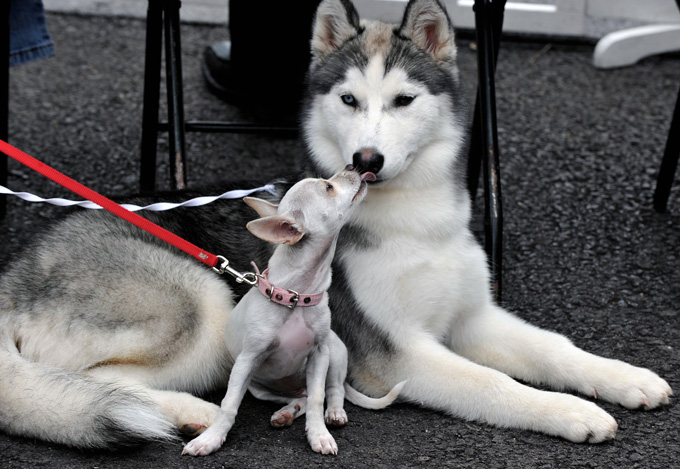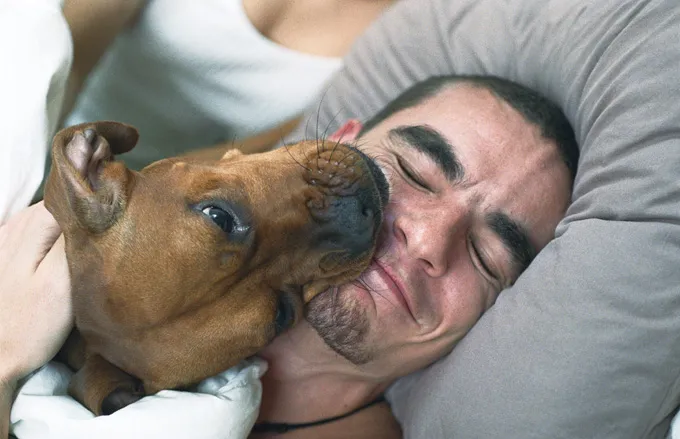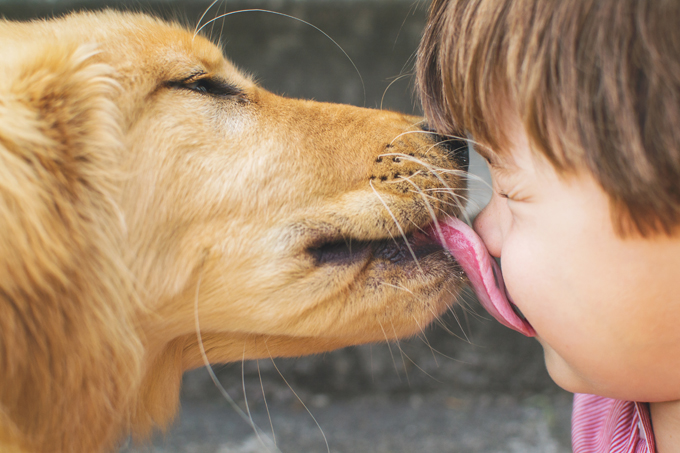The picture of a dog crouched low to the ground licking the lips of another dog’s lips is often viewed as a soft and friendly appeasement gesture. Face and lip licking is most often offered by young puppies, but can carry on into adulthood. Face licking does have boundaries in the dog-to-dog world of interaction and socialization. So, what face licking is appropriate and what’s out of bounds?
Young puppies are offered a lot of behavior leniencies by their elders. Their wiggly, squirming, jumpy, face licking greetings are often allowed by older dogs. The adult dog stops, stands still and allows the pup to do his thing before moving on. As a pup matures from puppyhood to adolescence, however, dogs begin to teach the youthful dog more appropriate, calm, and less in-your-face behavior. At times, if a pup’s face licking antics go overboard an elder will correct him with a sharp, “Enough already, get out of my face!”

I live with a rotational group of dogs, all from separate homes, at Far Fetched Acres. I see face and lip licking of all sorts. Offered by pups, the behavior is in stride with natural development and often accepted and tolerated by others. On the flip side, when offered incessantly by an eleven-month-old adolescent or adult, things can get a bit tense.
Incessant face lickers can get themselves into trouble and start trouble. If you’ve been following Dogspeak, you remember that dogs are prone to “sniff of the butt” greetings. Face licking relentlessly might be tolerated by some, but is considered rude and discouraged by others.
Luna is an energetic and pushy large female. As a puppy, she was always on her back, belly up, wiggling about and offering relentless face licking. People laughed and thought it was “submissive and cute.” She face licked her way into play and maneuvered dogs around a space throughout play with her tongue. She left the mouths of her canine friends spotless and would’ve licked my freckles straight off had I allowed it.
Leniency for her licky face puppy antics ran out though. While some put up with it, this behavior caused squabbles here and there. Dogs began to protest her face licking. The interesting thing is that when she was corrected for her attempts to lick their lips right off, she fought back.
If face licking were as simple as an innocent appeasement gesture, when Luna was told, “enough already,” quite ordinarily, why would she fight back?
Face licking is more complicated than most of us may think. In some cases, I think dogs like Luna can use face licking like Eddie Haskell. They throw out appeasement gestures that are syrupy sweet on the surface but have an agenda. In her case, “Play with me! The way I like it! Now!”
In other dogs, the frantic face licking seems like a reflection of anxiety. The dog is not overly self-assured and continues to offer the behavior as they have not developed a true confidence or natural ability to speak their own language more confidently and eloquently.
So, what seems within the range of normal and what’s out of bounds? Watch the reaction of the recipient. If the face licker is completely moving the recipient around a space — almost like herding the dog with his or her tongue, the behavior is likely over the top.
If your adolescent or adult dog offers incessant face licking with dogs that he does not have a solid relationship with, redirect his focus. Get him moving and doing something else. Do not correct him or physically pull him away as this will only fuel the issue. But call him off and tell him politely to go do something else like chase a ball or sniff grass. Other dogs in the park will appreciate your monitoring of his face cleaning services.

Oh, and about the dog that incessantly licks your face. Well, that’s up to you. I like calm, more refined greetings from dogs, like a nice massage or ear rub. My dog’s life is one big reminder in calm–she’s a freight train otherwise. If you don’t mind an organic dog face wash, well, go for it. If, however, the licking behavior is not calm, but overly excited and landing your dog into trouble with friends and other family members, probably best not to encourage it.
Save
Save









